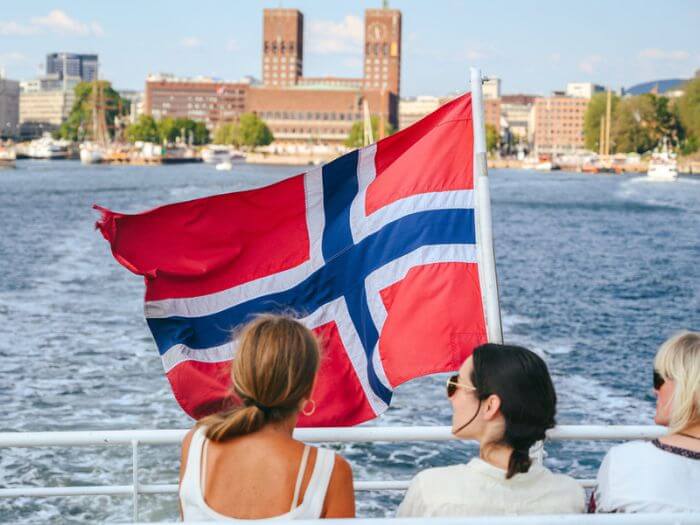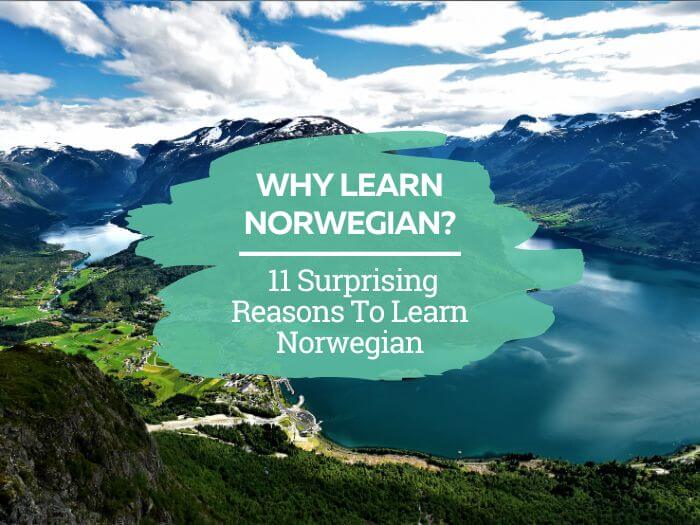Why learn Norwegian? If you're asking yourself this question, you're in the right place.
When you decide to learn a new language, you might pick one based on how many people in the world speak it.
Learning Norwegian will seem like an odd choice, because you won't find many people to talk to, especially outside of Norway.
Though spoken by barely 5 million people, Norwegian offers a few secret hidden gems that can open an entire new world for you.
So, why learn Norwegian? Time to discover 11 reasons to learn Norwegian.
Pro Tip
By the way, if you want to learn Norwegian fast and have fun, my top recommendation is Norwegian Uncovered which teaches you through StoryLearning®.
With Norwegian Uncovered you’ll use my unique StoryLearning® method to learn Norwegian through story…not rules. It’s as fun as it is effective. If you’re ready to get started, click here for a 7-day FREE trial.
Table of Contents
1. You Already Speak Some Norwegian

Most English language speakers aren't aware of the vast number of words deriving from the Nordic languages they already know and use themselves every day.
When the Vikings overran most of the British Isles, they left behind more than just burning monasteries, murder and mayhem. They also made an indelible mark on the English language.
Among the words from Norwegian we still use today are not only the obvious, war-related terms like ransaker (ransack) and å gå berserk (going berserk).
Each time you voice an English word beginning with sh, like skal (shall), skift (shift) or skulder (shoulder), it most likely has its origins a few centuries ago with a Viking hitting someone over the head while uttering a sk-sound.
Some corresponding words, like råtten (rotten), gå (go) and the unassuming egg (egg) for breakfast are even pronounced the same way.
And as you speak a certain amount of Norwegian already, you may as well go all the way and learn the rest. By the way, you might be interested in this post: is Norwegian hard to learn?
2. One Norwegian Rarely Comes Alone

Another Norwegian remnant probably stemming from the Viking era is their habit of coming in hordes. As soon as a Norwegian moves abroad, they'll immediately start searching for other Norwegians in the area.
At the same time, like their predecessors, they're social animals and even though they no longer enslave native populations (!), Norwegians still can captivate and make many local friends in their new neighbourhood.
The largest group of people interested in learning Norwegian I found to be British students who at university met and befriended a Norwegian.
The Norwegian would immediately include them into a circle of friends. But Norwegians will only ever speak their native language among themselves.
Not wanting to be left out of certain parts of the party, many British students decide to learn at least the basics of Norwegian in order to participate in their friends’ conversations and have the opportunity to eavesdrop.
3. Crazy Little Thing Called Love

Three in every ten marriages currently registered in Norway are between a Norwegian citizen and someone with a foreign background. Also you might have fallen – or intend on falling – in love with a Norwegian.
While Norwegians are still among the best non-native English-language speakers in the world, it might be appropriate to learn the language of your partner, especially if you plan to settle in Norway.
Learning the others’ language shows respect for who they are and where they come from. Remember, even Brad Pitt learned Greek when he married Jennifer Anniston.
4. Study Cheaper In Norway

Norway has altogether 29 universities, of which 20 are publicly financed. As of 2023, the state for the very first time requires universities to demand tuition fees for students outside the EU/EEA region.
Still, at NKR 8000 – NKR 15000 (£6200 – £11700) per year, those fees are a good deal lower than the UK (£9250) and especially the US ($don’t ask) level.
This is particularly true when you consider that UK universities demand £35000 and upwards of prospective Norwegian students asking to study there.
Norway has undoubtedly an excellent reputation in environmental studies, offshore and shipping related subjects as well as offering leading ocean research facilities.
It also offers unique opportunities to perform arctic studies on site with the most northern university in country, situated above the arctic circle in Tromsø.
While many courses at Norwegian universities are held in English, you'll find that you still need some Norwegian skills to follow and study the subjects in depth and to access all material available.
Some universities will also require you to pass a basic Norwegian language test before they accept you on the course.
5. Expand Your Research And Science Capabilities

Norwegian, or any of the Nordic tongues, belong to a small language group not often translated into English.
However, Norway especially, is a materially rich country investing much of the wealth into education, science and research. Many scholars and scientists from abroad use the universities and national libraries for their research purposes.
Not surprisingly, among those professional foreigners in Norway most likely to learn Norwegian are scholars and scientists.
When my friend was living in Norway, whenever she met an English language speaker there, she would ask them why they were learning Norwegian, especially since English truly is a second language in the country with an 88% proficiency within the population.
The fear of ‘Lost in Translation’ turned out to be the most significant point mentioned, even in the age of AI.
Translations, however brilliantly they might be executed, will always contain some grain of the third-person perspective of the translator. In the case of AI-translated content, insufficiencies with regards to context are added to the mix.
Besides, as a medical researcher at an Oslo University told my friend once, whenever he read an English paper written by a Norwegian scientist in his field, he got the impression that he only ever got parts of the story.
It seemed to him that the native Norwegian writer of a scientific paper might not include certain parts of their knowledge, because the correct or natural sounding English term had not come to mind at the time of writing.
He decided to meet his Norwegian counterparts halfway.
There's no place for cherry-picking in science and research as they require exact and not approximate conclusions. By learning Norwegian, you might considerably enhance your capabilities in your chosen field.
6. Join The Winning Sides In The Arctic Races

It’s a sore subject, especially in the UK, but nobody can help it. Roald Amundsen still won the race against Robert Scott in 1911 to be the first to stand on the South Pole.
Amundsen arrived there on a ship build for another giant in arctic exploration, Fritjof Nansen, who in 1888 was the first to cross Greenland and later on spent a record 3 years on the ship Fram, which remained frozen in ice most of the time.
Nansen and Amundsen’s endeavours are still the basis of any subsequent polar expeditions. And even today everyone with similar ambitions will have to consult their original papers on how they did it.
If you're a budding explorer, whether in person or just in mind from a safe – and warm – position on the couch, it pays to learn Norwegian to understand the source material.
If you are, however, more inclined towards warmer climates, Thor Heyerdahl and his Kon Tiki raft, with which he traversed the Pacific in 1947, might be your thing.
This Norwegian adventurer was not only an intrepid traveller, but also spent decades on archaeological digs, environmental research and peace activism.
Much of his large body of work remains only in the Norwegian language, and who knows, you might be the one to make it accessible to a larger audience.
7. Learn The Strange Norwegian Letters & How To Say Them

During the fuel shortage in 2020, a Norwegian-speaking friend stood in the queue at a UK petrol station next to a DIY-converted campervan wildly decorated with supposedly Nordic runes interspersed with the letters æ, ø and å.
As the queue was long, she struck up a conversation and the owner of the van happily informed her that he planned an extended trip to Norway once he got enough fuel.
She had to inform him that his arrangement of the letters meant nothing but gobbledygook once he would arrive in Norway. And he most probably would end up a laughingstock wherever he’d go!
He is, however, not the only perpetrator. Ad agencies tend to freshen up logos with those letters, partly due to them being advertised as ‘Latin letter merging a with e’, ‘Latin letter o with a stroke’ or ‘Latin letter a with ring above’ in typography charts.
Æ, ø and å are the last three letters of the Norwegian alphabet and represent a large part of the Nordic word composition – which you'll learn to appreciate once you start learning Norwegian.
8. Norwegian Literature And Nordic Noir

During a particularly rainy summer I was searching the library for a book long enough to keep me company throughout the holiday, and left with a battered, dusty copy of Nobel Prize Winner Sigrid Undseth’s “Kristin Lavransdatter”.
The fate of a 14th century noblewoman in the Norwegian mountains might not be everyone’s cup of tea. In recent years however, another literary and more modern phenomenon from up North has spread throughout the world.
The crime novels within the Nordic Noir genre have achieved a large international readership through their intriguing plots kept in a plain, largely metaphor-free language.
Jo Nesbø, Karin Fossum and Anne Holt are among the most popular Norwegian authors in the genre.
And while you might have enjoyed an English translation of their books, you'll soon find out that only parts of the large body of Nordic Noir literature have been published in the UK or US.
By learning Norwegian, you will gain a far greater access to Norwegian literature, whether you are a Nordic Noir reader or prefer historical tomes, like me! In the meantime, for something a bit simpler, here's some books to learn Norwegian.
9. Explore Norwegian Influences In Popular Culture

Once you speak Norwegian and have a better insight into the culture, you'll see the wildlings in “Game of Thrones”, the town of Dale in Tolkien’s Middle-earth canon as well as much of Neil Gaiman’s novels and Sandman comics in a different, more engaging light.
Also playing videogames like “Assassins Creed: Valhalla” and “Gods of War”, to mention only a few, will be so much more fun as you'll really appreciate, and understand, the maps and background designs with their Norwegian settings.
International streaming successes like “Ragnarok” or “Lilyhammer” can not only give you a greater insight into Norwegian manners and mannerisms, but also help you improve your language skills – as long as you watch them in the original language with subtitles.
10. Understand The Mechanisms Of Peace

It might seem odd that a people with the fearsome reputation for raiding what isn’t theirs would become known for its involvement in peace negotiations around the world.
Alfred Nobel already had an inkling of the Norwegians’ capabilities in peace-making. In his will in 1890 he gave clear instructions for the Norwegian parliament rather than his native Sweden’s to determine the Nobel Prize Committee for Peace.
Since the early 1990s, Norway has participated in, if not also initiated, almost 20 peace treaties – from Afghanistan and Israel to Myanmar and Venezuela.
Norwegians have an innate capability to listen – to both sides of the table. A long tradition in predominately oral storytelling during long winter nights has primed them for keeping quiet and pay attention to a speaker.
Despite their violent Viking past, they also have a great respect – and interest – for other cultures and belief systems, maybe because they themselves feel they belong to a minority in a global context.
11. You’ll Learn Norwegian Fast

As mentioned right at the start, the English language already includes of a certain portion of Norwegian words, but also the grammar and sentence structure of the two are very similar.
Most Norwegian-as-a-foreign-language learners can start conversing on a basic level within the first 6 – 12 months. The trick is to get a hang of Norwegian pronunciation.
Once you have an ‘ear’ for the language, you can often choose a word you might be missing in a conversation and replace it with the English by just pronouncing it the ‘Norwegian way’.
FAQs About Why Learn Norwegian?
Why learn Norwegian?
1. You already speak some Norwegian, even if you don't realise it
2. One Norwegian rarely comes alone – make new Norwegian friends
3. Crazy little thing called love – three in ten marriages registered in Norway are between a Norwegian and a foreigner
4. Study cheaper in Norway
5. Expand your research and science capabilities
6. Join the winning sides in the Arctic races
7. Know what the strange Norwegian letters actually mean – and how they're pronounced
8. Get greater access to Norwegian literature and Nordic Noir
9. Explore Norwegian Influences in popular culture like Neil Gaiman’s novels or video game such as Assassins Creed: Valhalla
10. Understand the mechanisms of peace
11. You’ll learn it fast and get to a basic conversational level in 6 to 12 months
What are the benefits of learning Norwegian?
Learning any new language broadens your horizons and can be beneficial for your brain.
As for Norwegian, one benefit is that you can expect to learn it quickly. You can reach a conversational level in 6-12 months, which can be good for motivation.
Norwegian can also be a useful language to learn for your career or studies. Studying in Norway can be cheaper than in the US or UK and many courses are in English (although you'll still need to pick up Norwegian for day-to-day life).
Internationally, Norway has a leading reputation in shipping, oil, marine biology and sustainable energy, to name only a few. So if you want to work in those sectors, particularly if you want to settle in Norway, then Norwegian is useful to learn.
Is it better to learn Swedish or Norwegian?
It depends. Are you planning to move to Sweden or to Norway? In that case, it's better to learn the language that corresponds to the country you're going to, even if the Scandinavian languages are supposed to be mutually intelligible.
Otherwise, Norwegian might have the edge over Swedish as it seems to be the language most understood by speakers of other Scandinavian and Nordic languages.
According to a report by the Nordic Council 80% of the Swedish, 67% of the Danish, 45% of the Icelandic and 22% of the Finnish respondents felt confident to understand Norwegian without having specifically learned the language.
The figures drop substantially when it comes to Swedish and Danish, the languages most closely related to Norwegian.
However, even here the Norwegians score higher, being able to understand 90% of the Swedish and 50% of the Danish content of a conversation.
Should I learn Norwegian?
The short answer is – it depends! If you're just going to Norway for a short holiday, it's probably not worth it as you'll be able to communicate in English, although learning a few basics such as greetings or how to say “thank you” is always appreciated.
If you're interested in Norwegian culture though, such as Nordic Noir or series like “Ragnarok”, you'll be able to appreciate it better in its original version. In the case of Norwegian literature, you can discover all the works that haven't been translated.
Norwegian is also a useful language to learn if you plan to study in Norway, even if your course is in English.
Finally, Norwegian is an easy language for native English speakers to learn. You can expect to reach a conversational level in 6-12 months.
So, Why Learn Norwegian?

Why learn Norwegian? Here's a final story to inspire you. The British explorer and translator Richard Burton (1821-1890) spoke 26 languages fluently and understood an additional 14 dialects.
As a result, the world at large got access to the stories of the Arabic “One Thousand and One Nights” and the Indian Kamasutra, which he translated.
His understanding of the languages enabled him to go places closed off to Western society, such as Mecca and yet undiscovered places in Africa.
Even though he spoke some of the most widespread languages, his main focus was on the small languages and dialects – because they gave him access to the locals and the culture of a country.
By learning Norwegian, you'll soon realise that an entire new world will open up for you. Whatever your reasons might be for having an interest in learning Norwegian, it will take you on an exciting journey.

Olly Richards
Creator of the StoryLearning® Method
Olly Richards is a renowned polyglot and language learning expert with over 15 years of experience teaching millions through his innovative StoryLearning® method. He is the creator of StoryLearning, one of the world's largest language learning blogs with 500,000+ monthly readers.
Olly has authored 30+ language learning books and courses, including the bestselling "Short Stories" series published by Teach Yourself.
When not developing new teaching methods, Richards practices what he preaches—he speaks 8 languages fluently and continues learning new ones through his own methodology.










































